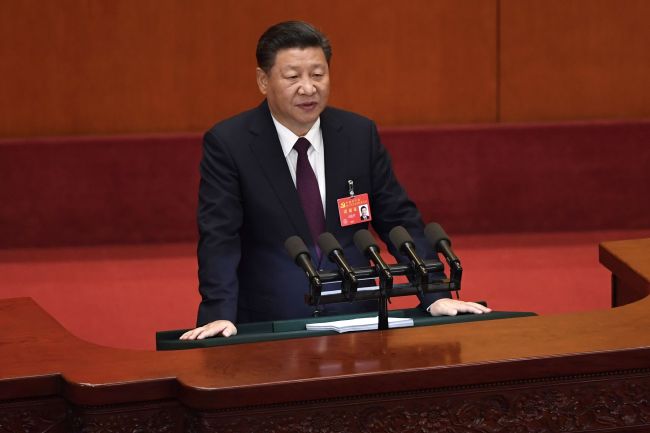BEIJING (AFP) - President Xi Jinping vowed on Wednesday to further open China’s economy to the world, but foreign companies and investors who have complained of “promise fatigue” called for deeds rather than words.
Xi made his pledge during a wide-ranging speech to open a week-long Communist Party congress that will hand him a new five-year term as general secretary.
“Openness brings progress for ourselves, seclusion leaves one behind. China will not close its doors to the world, we will only become more and more open,”
Xi told some 2,300 party delegates in Beijing.
Xi vowed to “protect the legitimate rights and interests of foreign investors” and said “all businesses registered in China will be treated equally”.
The Chinese leader has sought to cast himself as a champion of globalisation as the United States retreats behind President Donald Trump’s “America First” policy.
But US and European firms still complain about being barred from certain sectors and forced to share their technologies with local competitors to gain access in some industries.
“European companies operating in China continue to suffer from ‘promise fatigue’,” the European Union Chamber of Commerce in China said in a statement.
“The only cure for this is promise implementation.”
Trump, who will visit Beijing next month, has launched a trade investigation into China‘s intellectual property practices.
An expansive $300 billion plan called “Made in China 2025,” aims to reshape China’s economy but has drawn scrutiny from foreign business groups for its push to foster home grown companies in key industries.
“Xi‘s were welcome words and noble sentiments,” said Peter Fuhrman, chairman of boutique investment bank China First Capital.
“We hope the more obstructive, less visionary government officials across China will take Mr. Xi’s words as a command, not as one option among several,” he added.
 |
China's President Xi Jinping gives a speech at the opening session of the Chinese Communist Party's five-yearly Congress at the Great Hall of the People in Beijing on October 18, 2017. President Xi Jinping declared China is entering a "new era" of challenges and opportunities on October 18 as he opened a Communist Party congress expected to enhance his already formidable power. / AFP PHOTO |
- ‘Shared growth’ -
Around the world, Chinese conglomerates have been on a buying spree, snapping up companies in the entertainment, industrial and robotics industries.
But analysts and diplomats say those same opportunities are not afforded to foreign companies operating in China.
With the Trump administration in particular, China has faced scrutiny for its ballooning trade surplus with the United States, which reached a three-year high in September.
Xi said China will “give equal emphasis” to attracting capital and expanding abroad.
It remains to be seen if such words will mollify the Trump administration.
As a candidate Trump repeatedly threatened to label China a “currency manipulator” over what he deemed were unfair policies keeping down the value of the renminbi.
So far he has backed away from those promises as he sought China‘s help in dealing with North Korea.
Xi did note China will improve regulation around monetary and macro-prudential policy and “see that interest rates and exchange rates become more market based”.
- Hopes ’dashed‘ -
China’s debt mountain is a growing concern for policy makers and regulators around the world, who worry the rapid accumulation of credit could trigger a financial crisis.
To the audience of party leaders, Xi noted the importance of stronger financial regulation to “forestall systemic financial risks”.
But leverage has grown fastest in the corporate sector, particularly state-owned enterprises which have seen shrinking profits in the face of over-supply.
Xi said China needed to “consolidate” the public sector but also emphasised, “we will support state assets in becoming stronger, doing better, and growing bigger”.
“This should dash any remaining hopes that a market-led shake-up of the state sector may occur in Xi‘s second term,” said Julian Evans-Pritchard, China economist at Capital Economics.
“This suggests that many of China’s structural problems that are, in our view, caused by the state‘s outsized role in the economy, will remain unresolved.”
China’s economy has built up debt as the the government has turned to investment to boost growth. In the three-and-a-half hour speech, Xi indicated there may be more room for slower growth ahead.
“China‘s economy has been transitioning from a phase of rapid growth to a stage of high-quality development,” Xi said.
Analysts focused on what was left unsaid.
During the opening speech of the 2012 congress given by Xi’s predecessor Hu Jintao, Hu said by 2020 China should aim to double its GDP and per capita income from 2010 levels.
“Such a target underpins the stimulus we have seen over the past five years,” wrote Larry Hu, an analyst at Macquarie Capital Limited, in a research note.
“But this time, President Xi didn‘t reiterate the goal and he didn’t mention any new growth target either.”






![[Herald Interview] 'Trump will use tariffs as first line of defense for American manufacturing'](http://res.heraldm.com/phpwas/restmb_idxmake.php?idx=644&simg=/content/image/2024/11/26/20241126050017_0.jpg)
![[Exclusive] Hyundai Mobis eyes closer ties with BYD](http://res.heraldm.com/phpwas/restmb_idxmake.php?idx=644&simg=/content/image/2024/11/25/20241125050044_0.jpg)
